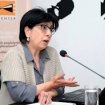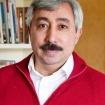“The Role of External Factors in the Karabakh Process - 2018: Mediators, Regional Actors and International Organizations”
The online conference was held on Public Dialogues website (www.publicdialogues.info). It was organized within the framework of “Public Dialogues for Communication between Armenian and Azerbaijani Specialists” project, implemented by Region Research Center. The project is supported by the Black Sea Trust for Regional Cooperation, German Marshall Fund. The project partner is the Institute for Peace and Democracy (the Netherlands). The "Public Dialogues" website was created in 2012 by Region Research Center and the Institute for Peace and Democracy.
Participants
Arman Melikyan (Armenia) – Ambassador Extraordinary and Plenipotentiary of RA, Ex-Minister of Foreign Affairs of NKR
Andrey Areshev (Russia) – Expert at the Strategic Culture Foundation, Research Fellow at the Centre for Central Asia and Caucasus Studies
Rauf Mirkadyrov (Switzerland) – journalist
Vyacheslav Mamedov (The Netherlands) – journalist, public figure
The conference was moderated by Laura Baghdasaryan (Armenia) - Director of Region Research Center
The following issues were discussed
• The probability of the resumption of hostilities in the Karabakh conflict zone after the April clashes,
• Possible scenarios of developments, should the military clashes unfold: the recognition of the NKR by Armenia and the reaction of other countries, the degree of probability for the application of a “coercion to peace” mechanism in the present layout of international developments,
• The probability of opening a second front in Nakhijevan as a possibility for achieving military advantage, as well as leverage upon such countries as Turkey and Russia which in these circumstances would already have to enter a military confrontation with one another,
• The impact of the wave of violence and the wars in Syria and the Middle East on the situation around the Karabakh conflict,
• The levers of regional actors and official mediators to prevent, or, on the contrary, to push for the realization of this scenario,
• Informal signals and backstage arrangements with the parties of the conflict,
• The objective of the prevention of the most negative scenarios, which of the external actors can resolve it,
• Bellicose rhetoric as a topical element of the policies pursued by the parties of the conflict, aggressive rhetoric directed not only to the opposite party, but also countries for whom the military outbreak in the Karabakh zone is not beneficial either,
• Supply of arms to the parties of the conflict as a tool of political influence and business,
• The problem of long-term unanimity of the Karabakh conflict mediators in the context of international tension and turbulence,
• The susceptibility of external actors to the arguments of the parties of the conflict upon the unfolding of military operations and the attempts of political solution,
• Resources available for the political solution to the conflict,
• Coalitions Russia, Azerbaijan, Georgia, Iran, Turkey are affiliated with and the Karabakh conflict,
• Probability of concluding a military alliance between Turkey and Azerbaijan.
The online conference was held in Russian. Here we present some excerpts in English. Read the full text of the online conference in Russian HERE.
On the Sustainability of Consensus between Russia and the West in the Zone of the Karabakh Conflict
Pages
- 1
- 2
- 3
- 4
- 5
- 6
- 7
- 8
- следующая ›
- последняя »







 +37410 563363
+37410 563363
 ул. Бузанда 1/3, 8-й этаж, Ереван, Армения
ул. Бузанда 1/3, 8-й этаж, Ереван, Армения